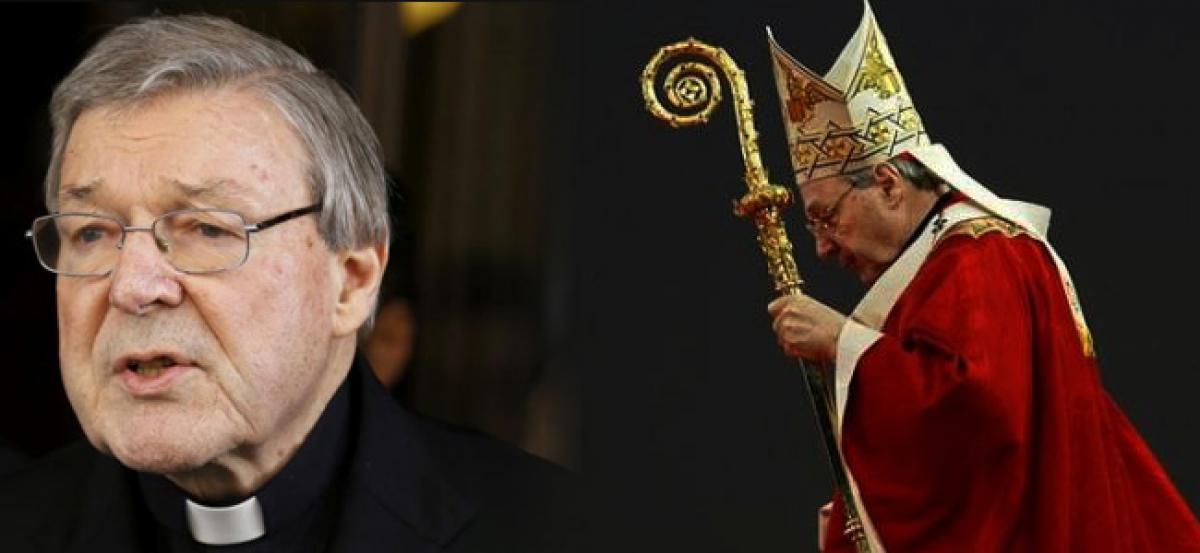Live
- Sanju Samson and Tilak Varma Shine: Record-Breaking Feats in 4th T20I Against South Africa
- India Urges $1.3 Trillion Annual Climate Support for Developing Nations
- Bad air: 106 shuttle buses, 60 extra Metro trips planned to make Delhiites give up cars
- WHO reports declining monkeypox cases in Congo
- CM Attends Kotideepotsavam on Kartika Purnima
- PKL Season 11: Raiding trio of Devank, Ayan, Sandeep help Patna Pirates rout Bengal Warriorz
- Food waste crisis fuels sustainable practices across APAC food & beverage industry: Report
- AI helps erase racist deed restrictions in California
- ATMIS completes third phase of troops' drawdown in Somalia
- PM Kisan Samman Nidhi scheme bringing smile to Nalanda farmers
Just In

Australian police on Thursday charged Cardinal George Pell, a top adviser to Pope Francis, with multiple historical sex crimes, bringing a worldwide abuse scandal to the heart of the Vatican.
VATICAN CITY/SYDNEY: Australian police on Thursday charged Cardinal George Pell, a top adviser to Pope Francis, with multiple historical sex crimes, bringing a worldwide abuse scandal to the heart of the Vatican.
As Vatican economy minister, Pell is the highest-ranking Church official to face such accusations. He asserted his innocence and said the pontiff had given him leave of absence to return to Australia to defend himself.
"I am looking forward finally to having my day in court. I repeat that I am innocent of these charges. They are false," the 76-year-old told a news conference. "The whole idea of sexual abuse is abhorrent to me."
Pell's high-profile departure, even if only temporary, poses a dilemma for a pontiff who has vowed zero tolerance for such offences.
It may also have implications for Francis' drive to reform Vatican finances, which has been spearheaded by Pell, who also sits on a panel of nine cardinals from around the world who advise the pope.
Police in the Australian state of Victoria, where Pell was a country priest in the 1970s, said he faced "multiple charges in respect of historic sexual offences" from multiple complainants.
They did not detail the charges against Pell or specify the ages of the alleged victims or the period when the crimes were alleged to have occurred. He was ordered to appear before Melbourne Magistrates' Court on July 18.
"CLEAR MY NAME"
Pell, who declined to take questions, decried a "relentless character assassination" by the media and said he wanted to "clear my name and then return to my work in Rome".
Vatican spokesman Greg Burke said Pell would not appear in public church services for the time being.
Pell had told an Australian government inquiry into institutional child abuse last year that the Church had made "catastrophic" choices by refusing to believe abused children, shuffling abusive priests from parish to parish, and relying too heavily on the counsel of priests to solve the problem.
But he angered victims by saying he was too ill to fly home, testifying instead from Rome.
Then, last July, Victoria police confirmed that Pell himself was being investigated on suspicion of child sexual abuse.
He indicated on Thursday that he would now go to Australia: "I have spoken to my lawyers about when I need to return home and to my doctors about how best to do this."
Francis said last year that Pell should not undergo trial by media, adding: "It's in the hands of the justice system and one cannot judge before the justice system ... After the justice system speaks, I will speak."
But the latest development was a blow to the pope and put pressure on him to make good on promises finally to root out sexual abuse in the Church and act against those who cover it up.
Marie Collins, the top non-clerical member of a papal commission on abuse, resigned in frustration this year, citing "shameful" resistance to change within the Vatican.
GLOBAL SCANDAL
Church sexual abuse broke into the open in 2002, when it was discovered that U.S. bishops in the Boston area had simply moved abusers to new posts instead of defrocking them.
Thousands of cases have come to light around the world as investigations have encouraged long-silent victims to go public, shattering the Church's reputation in places such as Ireland, and more than $2 billion have been paid in compensation.
"I would suspect (the charges against Pell) are going to be stunning to the Vatican and to the pope himself," said Thomas P. Doyle, the U.S. priest whose report on sexual abuse in the Church led to the discovery of cover-up practices in Boston.
Under previous popes, the Vatican, a sovereign state in the middle of Rome, sheltered officials wanted by other countries.
In the early 1980s, the Vatican refused an Italian request to hand over Archbishop Paul Marcinkus - an American who was then head of the Vatican bank and was wanted for questioning about the fraudulent bankruptcy of a private Italian bank.
Cardinal Bernard Law of Boston moved to Rome after a sexual abuse scandal erupted in his diocese, and has been living in the Italian capital for more than 15 years.
Victims groups were outraged when Law, now 85 and retired, was given a plum job as chief priest at a Rome basilica by the late Pope John Paul II.
However, Francis was tough in the case of Jozef Wesolowski, a former archbishop who was accused of paying for sex with minors while serving as papal ambassador in the Dominican Republic.
Wesolowski was recalled in 2013, defrocked and arrested in the Vatican in 2014, but died shortly before his trial was due to start in 2015.

© 2024 Hyderabad Media House Limited/The Hans India. All rights reserved. Powered by hocalwire.com







